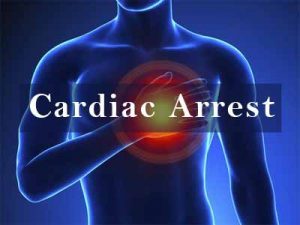- Home
- Editorial
- News
- Practice Guidelines
- Anesthesiology Guidelines
- Cancer Guidelines
- Cardiac Sciences Guidelines
- Critical Care Guidelines
- Dentistry Guidelines
- Dermatology Guidelines
- Diabetes and Endo Guidelines
- Diagnostics Guidelines
- ENT Guidelines
- Featured Practice Guidelines
- Gastroenterology Guidelines
- Geriatrics Guidelines
- Medicine Guidelines
- Nephrology Guidelines
- Neurosciences Guidelines
- Obs and Gynae Guidelines
- Ophthalmology Guidelines
- Orthopaedics Guidelines
- Paediatrics Guidelines
- Psychiatry Guidelines
- Pulmonology Guidelines
- Radiology Guidelines
- Surgery Guidelines
- Urology Guidelines
70% of Women having sudden Cardiac Arrest have no prior history of CVD

70% of women who die from sudden cardiac arrest have no history of heart disease, according to a recent study conducted by Paras Hospitals, Gurgaon. The researchers found that individuals with lower levels of calcium in the blood, which is easily monitored, are more likely to experience SCA than those with higher calcium levels. Women with calcium levels less than 8.95 mg/dL were 2.3 times more likely to have sudden cardiac arrest compared with those with levels higher than 9.55 mg/ dL. The new study has been published in Mayo Clinic Proceedings.
Globally 1 in every 4 women dies of heart failure as women are less likely to get treatment and diagnosis of the disease. Cardiac arrest is one of the leading causes of death in India and kills more people than any single cancer.
People who are already suffering from heart diseases have higher chances of sudden cardiac arrest. But, surprisingly cardiac arrest have become common in people especially women who look absolutely healthy and have no known history of heart disease
Dr.D.K.Jhamb, Director & HOD Cardiology, Paras Hospital says, "It is estimated that approximately 3,00,000 individuals die of sudden cardiac arrest annually in India. However, 70% of women who die of sudden cardiac arrest have no history of heart disease before their cardiac arrest. Most of the women don't even know that they have already suffered one or two heart attacks in past until they visit doctors. Being healthy is no insurance against heart diseases. Today, heart attacks are striking at a younger age, making those in their 30s and 40s the new high-risk categories, possibly due to high-pressure lifestyles and low levels of calcium.
Cardiac arrest and heart attack differentiated
The basic difference between both is that during a heart attack, blood flow stops in a particular part of the heart and thus, damages it. However, in cardiac arrest, it's an electrical problem where the heart stops working altogether leaving the person with no pulse and unconscious. The sudden cardiac arrest is when the heart unexpectedly stops beating, restricting blood flow to all the other vital body parts. If proper medical attention is not received, this can result in the death of a person within a few minutes.
Talking about the causes and symptoms of heart diseases, Dr. Amit Bhushan Sharma, Unit Head and Associate Director said that symptoms in men are clear than in women. In men, there is extreme pain accompanying cold sweats in the heart attack but in women, the heart attack can be much more frequent and smaller. Eight out of 10 times the causes of cardiac arrest in women is a blockage in the heart.
Lower calcium levels were independent with an increased risk of sudden cardiac arrest in women. Women with calcium levels less than 8.95 mg/dL were 2.3 times more likely to have sudden cardiac arrest compared with those with levels higher than 9.55 mg/dL. Unhealthy lifestyle and changing food habits such as food rich in fats and carbohydrates and late dinners are some of the major factors of heart diseases. Besides that low physical activity, consumption of alcohol, smoking and high blood pressure in women elevates the risk of heart disease in women.
Unlike men, women too have some added responsibility, like looking after her kids, their parents and family. While trying to keep up everything they tend to forget to keep a check on their own health and thus ends up living with poor health.
The study suggested that women should have a regular check-up and should maintain a healthy lifestyle. Taking a proper diet and doing a regular exercise will help to lower the level of cholesterol in the blood and thus reduce the risk of heart disease."

Disclaimer: This site is primarily intended for healthcare professionals. Any content/information on this website does not replace the advice of medical and/or health professionals and should not be construed as medical/diagnostic advice/endorsement or prescription. Use of this site is subject to our terms of use, privacy policy, advertisement policy. © 2020 Minerva Medical Treatment Pvt Ltd